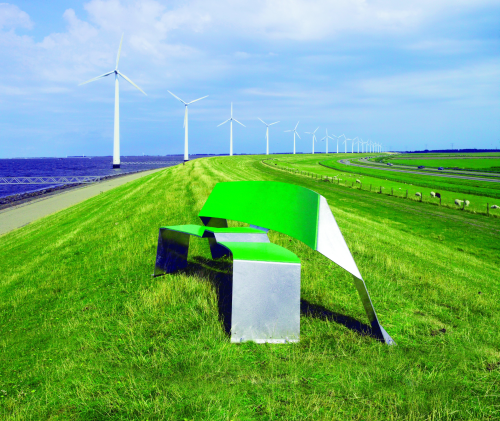
The products were launched simultaneously in April at the JEC Composites Show 2010 in Paris and the Society of Automotive Engineers (SAE) 2010 World Congress in Detroit.
The thermoset resin, Palapreg® ECO P55-01, is designed for use in sheet and bulk moulding compound (SMC, BMC) for applications ranging from under-body shields to Class A exterior body panels. It is composed of 55% renewable resources. DSM says this makes it the composite resin with the highest bio-based content available on the market today. (The company cannot currently reveal the bio content of the resin, which is being patented.)
DSM says industry testing has proven that the high renewable content of Palapreg ECO P55-01 does not reduce the material's product performance or production speeds.
Palapreg ECO P55-01 is commercially available and its first application is actually in the construction market, in the ‘Come Back’ outdoor bench manufactured by European street furniture manufacturer VelopA. Palapreg ECO P55-01 has also been used for the bodywork of a kart competing in Formula Zero, the world’s first zero-emission motor racing championship, and has been approved by the Formula One Association (FIA).
Mixt Composites Recyclables (MCR), a French developer of automotive products, has been testing Palapreg ECO.
"We have tested Palapreg ECO on a range of automotive applications and it consistently matched conventional alternatives in terms of performance and functionality,” says Christophe Peyre of MCR. “Through its industry-leading bio-based content, we believe Palapreg ECO represents an excellent opportunity for the car industry to meet its sustainability targets and we look forward to working with DSM to help make these goals a reality."
The second bio-based resin is EcoPaXX™, a high-performance polyamide (PA 410) that combines a high melting point (approximately 250°C), low moisture absorption and excellent resistance to chemical substances (including road salt). Approximately 70% of the material is based on building blocks derived from castor oil, a renewable resource. Potential automotive applications for the product include components in the engine compartment where heat resistance and chemical/hydrolytic resistance are key. It can be injection moulded into parts, or extruded into films.
The product is 100% carbon neutral ‘from cradle to gate’ (the point at which it leaves DSM’s premises).
EcoPaXX will be commercially available in the first quarter of 2011. It is currently being tested by several customers in the automotive industry.
DSM says it is now working on developing materials with 100% bio-based content.
“The limited availability and the environmental impact of fossil-based raw materials creates a clear need for new and sustainable raw materials,” Nico Gerardu, member of the DSM Managing Board and responsible for the Performance Materials cluster. “By combining its unique competences in Life Sciences and Materials Sciences, DSM is well placed to create these solutions.”
Copyright © 2010 Elsevier Ltd. All rights reserved.



